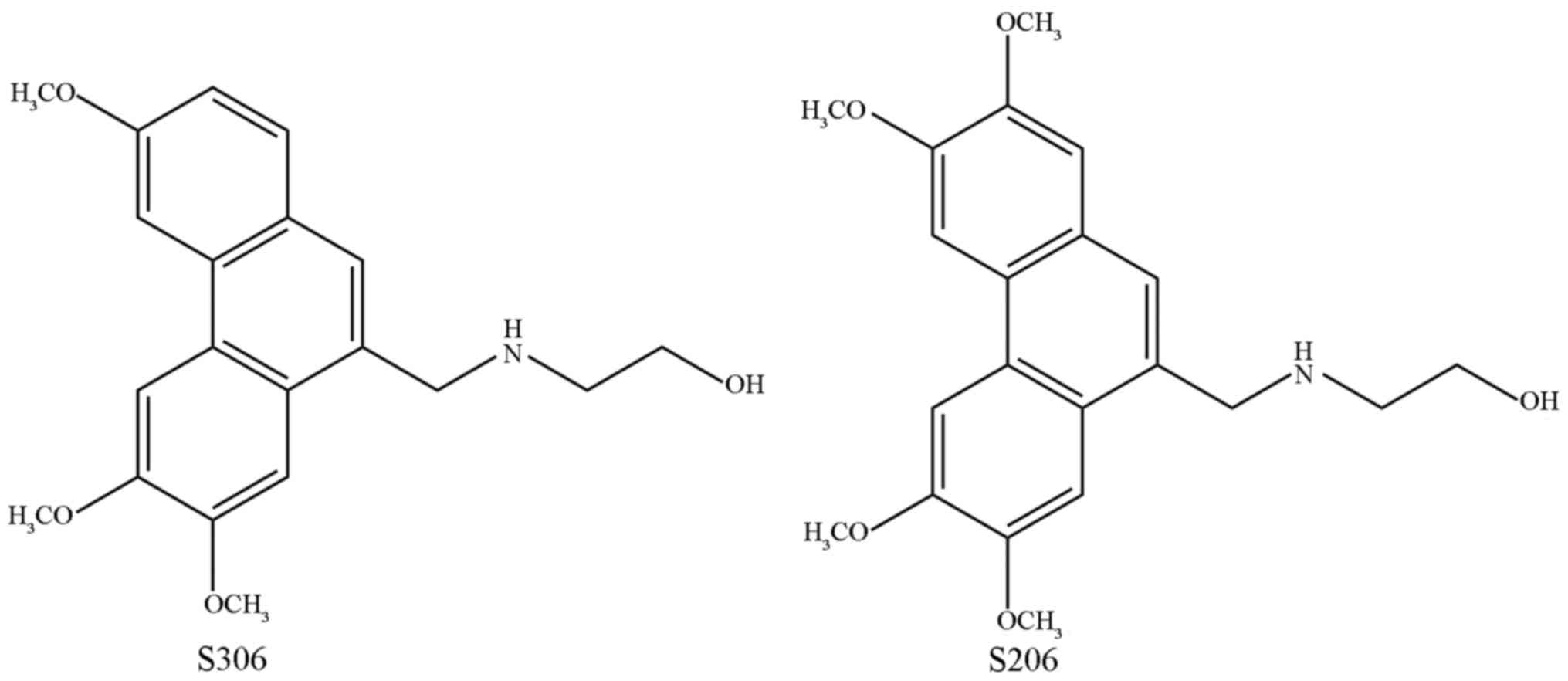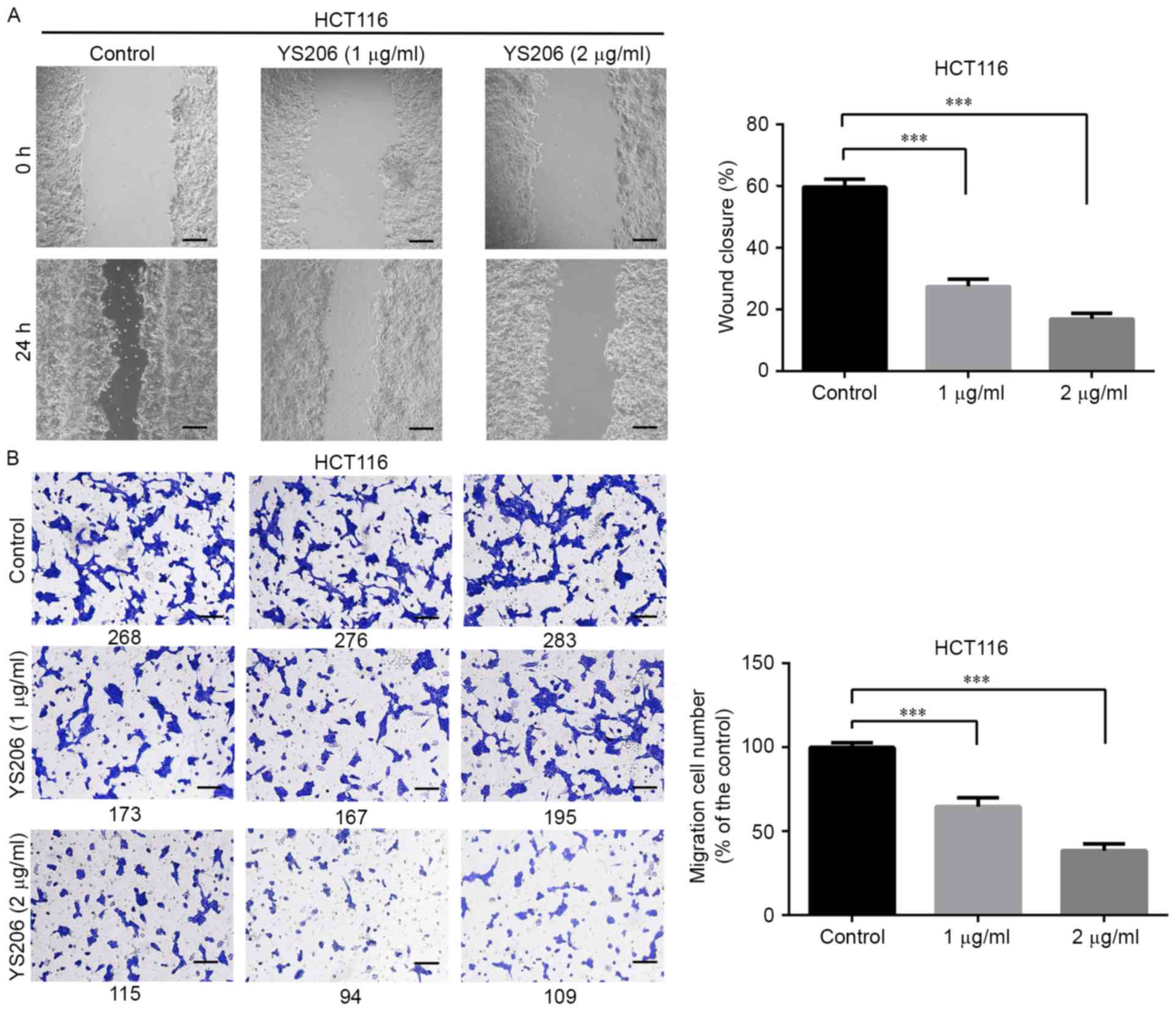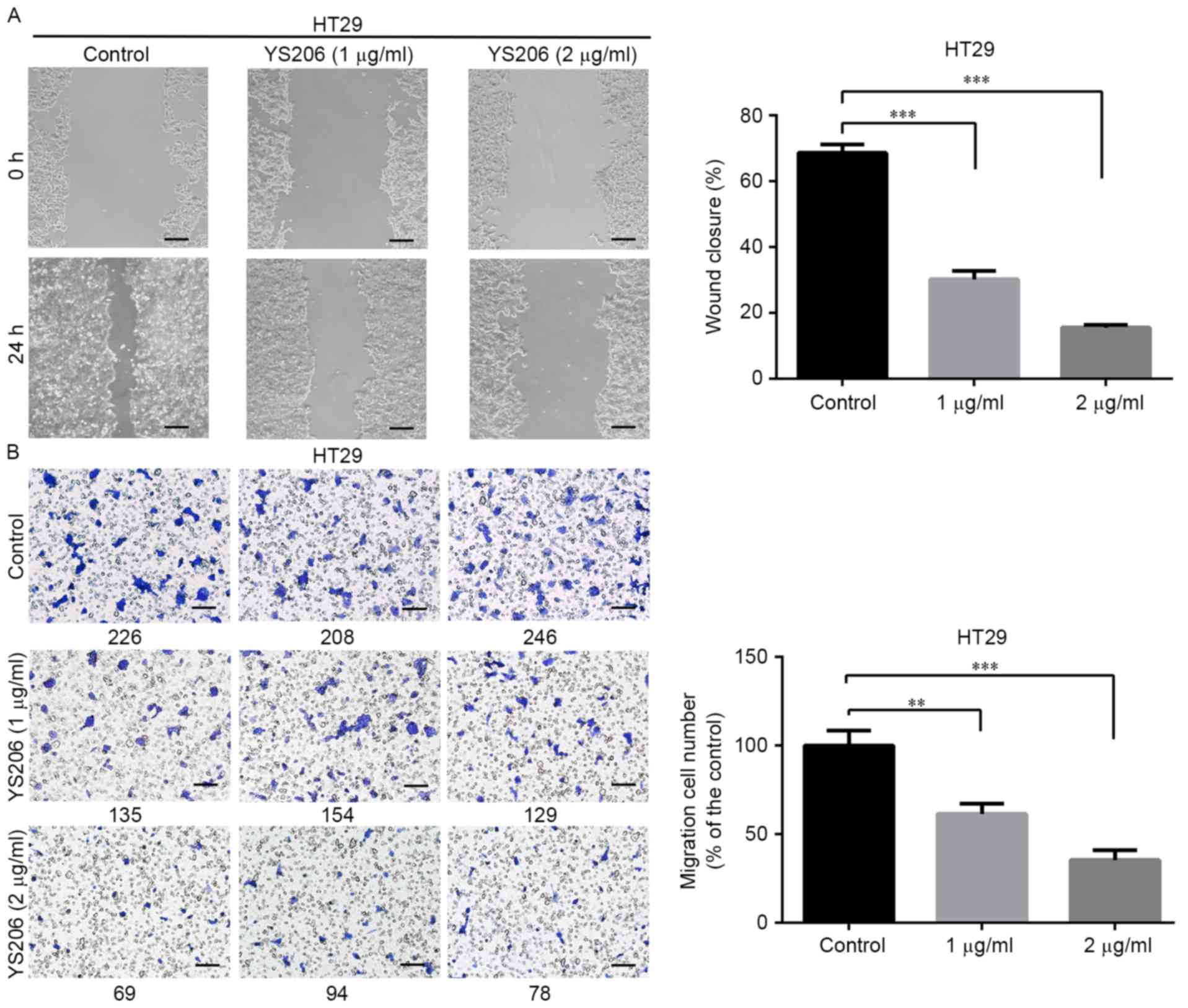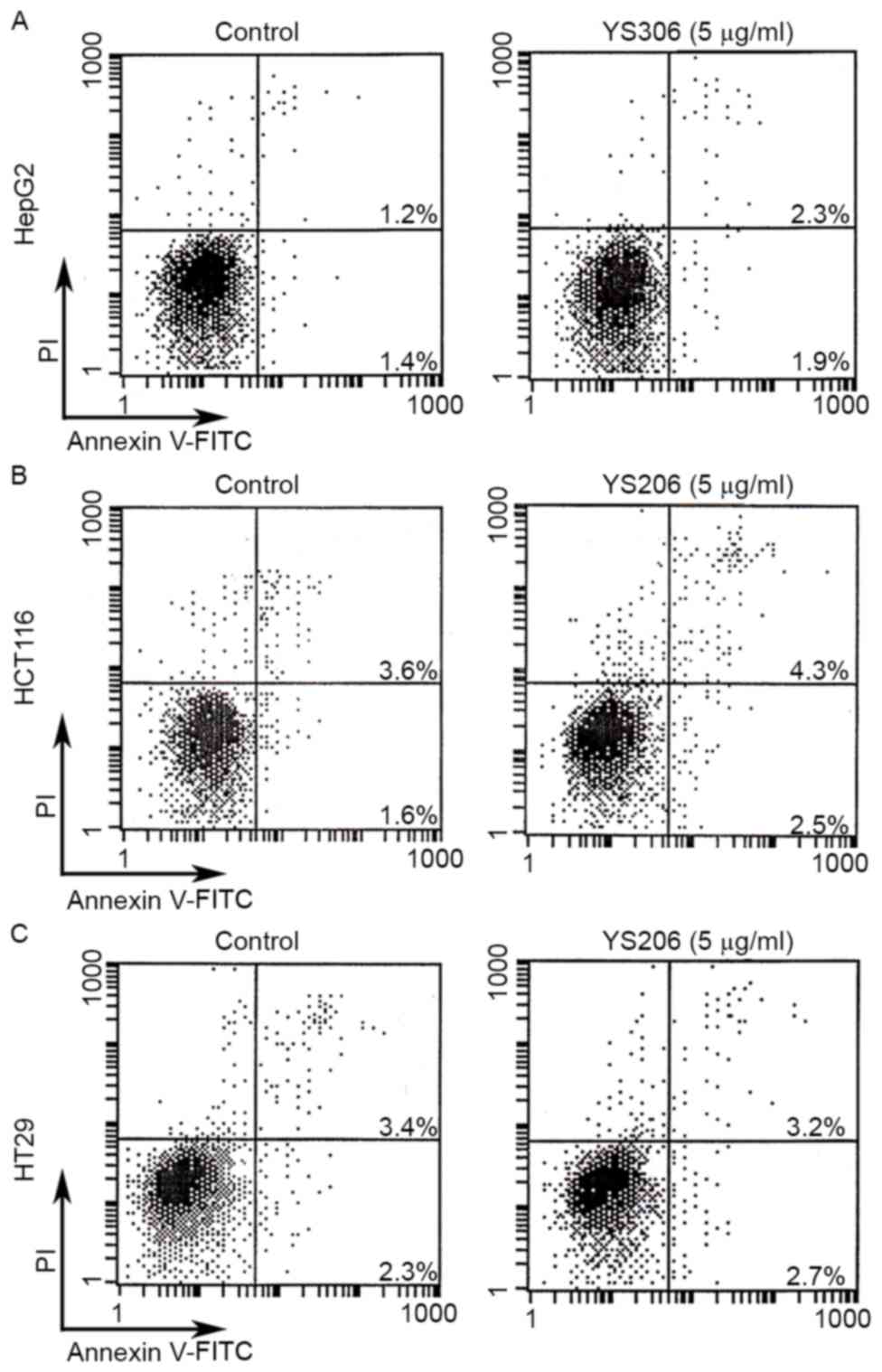|
1
|
Torre LA, Bray F, Siegel RL, Ferlay J,
Lortet-Tieulent J and Jemal A: Global cancer statistics, 2012. CA
Cancer J Clin. 65:87–108. 2015. View Article : Google Scholar : PubMed/NCBI
|
|
2
|
Chen W, Zheng R, Baade PD, Zhang S, Zeng
H, Bray F, Jemal A, Yu XQ and He J: Cancer statistics in China,
2015. CA Cancer J Clin. 66:115–132. 2016. View Article : Google Scholar : PubMed/NCBI
|
|
3
|
Newman DJ and Cragg GM: Natural products
as sources of new drugs over the 30 years from 1981 to 2010. J Nat
Prod. 75:311–335. 2012. View Article : Google Scholar : PubMed/NCBI
|
|
4
|
Cushnie TT, Cushnie B and Lamb AJ:
Alkaloids: An overview of their antibacterial, antibiotic-enhancing
and antivirulence activities. Int J Antimicrob Agents. 44:377–386.
2014. View Article : Google Scholar : PubMed/NCBI
|
|
5
|
Saraswati S, Kanaujia PK, Kumar S, Kumar R
and Alhaider AA: Tylophorine, a phenanthraindolizidine alkaloid
isolated from Tylophora indica exerts antiangiogenic and
antitumor activity by targeting vascular endothelial growth factor
receptor 2-mediated angiogenesis. Mol Cancer. 12:822013. View Article : Google Scholar : PubMed/NCBI
|
|
6
|
Ibrahim SR and Mohamed GA: Marine
pyridoacridine alkaloids: Biosynthesis and biological activities.
Chem Biodivers. 13:37–47. 2016. View Article : Google Scholar : PubMed/NCBI
|
|
7
|
Ansha C and Mensah K: A review of the
anticancer potential of the antimalarial herbal cryptolepis
sanguinolenta and its major alkaloid cryptolepine. Ghana Med J.
47:137–147. 2014.
|
|
8
|
Staerk D, Lykkeberg AK, Christensen J,
Budnik BA, Abe F and Jaroszewski JW: In vitro cytotoxic activity of
phenanthroindolizidine alkaloids from Cynanchum vincetoxicum
and Tylophora tanakae against drug-sensitive and
multidrug-resistant cancer cells. J Nat Prod. 65:1299–1302. 2002.
View Article : Google Scholar : PubMed/NCBI
|
|
9
|
Su CR, Damu AG, Chiang PC, Bastow KF,
Morris-Natschke SL, Lee KH and Wu TS: Total synthesis of
phenanthroindolizidine alkaloids (±/−)-antofine,
(±/−)-deoxypergularinine, and their dehydro congeners and
evaluation of their cytotoxic activity. Bioorg Med Chem.
16:6233–6241. 2008. View Article : Google Scholar : PubMed/NCBI
|
|
10
|
Jin X, Liu Y, Liu J, Lu W, Liang Z, Zhang
D, Liu G, Zhu H, Xu N and Liang S: The overexpression of IQGAP1 and
β-catenin is associated with tumor progression in hepatocellular
carcinoma in vitro and in vivo. PLoS One. 10:e01337702015.
View Article : Google Scholar : PubMed/NCBI
|
|
11
|
Zhou J, Liang S, Fang L, Chen L, Tang M,
Xu Y, Fu A, Yang J and Wei Y: Quantitative proteomic analysis of
HepG2 cells treated with quercetin suggests IQGAP1 involved in
quercetin-induced regulation of cell proliferation and migration.
OMICS. 13:93–103. 2009. View Article : Google Scholar : PubMed/NCBI
|
|
12
|
Shang S, Monfregola L and Caruthers MH:
Peptide-substituted oligonucleotide synthesis and non-toxic,
passive cell delivery. Sig Trans Target Ther. 16019:2016.
|
|
13
|
Newman DJ, Cragg GM and Snader KM: Natural
products as sources of new drugs over the period 1981–2002. J Nat
Prod. 66:1022–1037. 2003. View Article : Google Scholar : PubMed/NCBI
|
|
14
|
Lv H, Ren J, Ma S, Xu S, Qu J, Liu Z, Zhou
Q, Chen X and Yu S: Synthesis, biological evaluation and mechanism
studies of deoxytylophorinine and its derivatives as potential
anticancer agents. PLoS One. 7:e303422012. View Article : Google Scholar : PubMed/NCBI
|
|
15
|
Rao KN and Venkatachalam S: Inhibition of
dihydrofolate reductase and cell growth activity by the
phenanthroindolizidine alkaloids pergularinine and tylophorinidine:
The in vitro cytotoxicity of these plant alkaloids and their
potential as antimicrobial and anticancer agents. Toxicol In Vitro.
14:53–59. 2000. View Article : Google Scholar : PubMed/NCBI
|
|
16
|
Ueno S, Yamazaki R, Ikeda T, Yaegashi T
and Matsuzaki T: Antitumor effect of a novel phenanthroindolizidine
alkaloid derivative through inhibition of protein synthesis.
Anticancer Res. 34:3391–3397. 2014.PubMed/NCBI
|
|
17
|
Song J, Kwon Y, Kim S and Lee SK:
Antitumor activity of phenanthroindolizidine alkaloids is
associated with negative regulation of met endosomal signaling in
renal cancer cells. Chem Biol. 22:504–515. 2015. View Article : Google Scholar : PubMed/NCBI
|
|
18
|
Wu TS, Su CR and Lee KH: Cytotoxic and
anti-HIV phenanthroindolizidine alkaloids from Cryptocarya
chinensis. Nat Prod Commun. 7:7252012.PubMed/NCBI
|
|
19
|
Hanahan D and Weinberg RA: The hallmarks
of cancer. Cell. 100:57–70. 2000. View Article : Google Scholar : PubMed/NCBI
|
|
20
|
Schwartz GK and Shah MA: Targeting the
cell cycle: A new approach to cancer therapy. J Clin Oncol.
23:9408–9421. 2005. View Article : Google Scholar : PubMed/NCBI
|
|
21
|
Park EJ, Chung HJ, Park HJ, Kim GD, Ahn YH
and Lee SK: Suppression of Src/ERK and GSK-3/β-catenin signaling by
pinosylvin inhibits the growth of human colorectal cancer cells.
Food Chem Toxicol. 55:424–433. 2013. View Article : Google Scholar : PubMed/NCBI
|
|
22
|
Matsushime H, Quelle DE, Shurtleff SA,
Shibuya M, Sherr CJ and Kato JY: D-type cyclin-dependent kinase
activity in mammalian cells. Mol Cell Biol. 14:2066–2076. 1994.
View Article : Google Scholar : PubMed/NCBI
|
|
23
|
Chung HJ, Park EJ, Pyee Y, Xu G Hua, Lee
SH, Kim YS and Lee SK: 25-Methoxyhispidol A, a novel triterpenoid
of Poncirus trifoliata, inhibits cell growth via the
modulation of EGFR/c-Src signaling pathway in MDA-MB-231 human
breast cancer cells. Food Chem Toxicol. 49:2942–2946. 2011.
View Article : Google Scholar : PubMed/NCBI
|
|
24
|
Min HY, Chung HJ, Kim EH, Kim S, Park EJ
and Lee SK: Inhibition of cell growth and potentiation of tumor
necrosis factor-α (TNF-α)-induced apoptosis by a
phenanthroindolizidine alkaloid antofine in human colon cancer
cells. Biochem Pharmacol. 80:1356–1364. 2010. View Article : Google Scholar : PubMed/NCBI
|
|
25
|
Lee SK, Nam KA and Heo YH: Cytotoxic
activity and G2/M cell cycle arrest mediated by antofine, a
phenanthroindolizidine alkaloid isolated from Cynanchum
paniculatum. Planta Med. 69:21–25. 2003. View Article : Google Scholar : PubMed/NCBI
|
|
26
|
Himes RH, Kersey RN, Heller-Bettinger I
and Samson FE: Action of the vinca alkaloids vincristine,
vinblastine, and desacetyl vinblastine amide on microtubules in
vitro. Cancer Res. 36:3798–3802. 1976.PubMed/NCBI
|
|
27
|
Cheng GZ, Chan J, Wang Q, Zhang W, Sun CD
and Wang LH: Twist transcriptionally up-regulates AKT2 in breast
cancer cells leading to increased migration, invasion, and
resistance to paclitaxel. Cancer Res. 67:1979–1987. 2007.
View Article : Google Scholar : PubMed/NCBI
|
|
28
|
Kwon Y, Song J, Lee B, In J, Song H, Chung
HJ, Lee SK and Kim S: Design, synthesis, and evaluation of a
water-soluble antofine analogue with high antiproliferative and
antitumor activity. Bioorg Med Chem. 21:1006–1017. 2013. View Article : Google Scholar : PubMed/NCBI
|
|
29
|
Gao W, Bussom S, Grill SP, Gullen EA, Hu
YC, Huang X, Zhong S, Kaczmarek C, Gutierrez J, Francis S, et al:
Structure-activity studies of phenanthroindolizidine alkaloids as
potential antitumor agents. Bioorg Med Chem Lett. 17:4338–4342.
2007. View Article : Google Scholar : PubMed/NCBI
|
|
30
|
Wang Z, Wu M, Wang Y, Li Z, Wang L, Han G,
Chen F, Liu Y, Wang K, Zhang A, et al: Synthesis and SAR studies of
phenanthroindolizidine and phenanthroquinolizidine alkaloids as
potent anti-tumor agents. Eur J Med Chem. 51:250–258. 2012.
View Article : Google Scholar : PubMed/NCBI
|
|
31
|
Fu Y, Lee SK, Min HY, Lee T, Lee J, Cheng
M and Kim S: Synthesis and structure-activity studies of antofine
analogues as potential anticancer agents. Bioorg Med Chem Lett.
17:97–100. 2007. View Article : Google Scholar : PubMed/NCBI
|






















